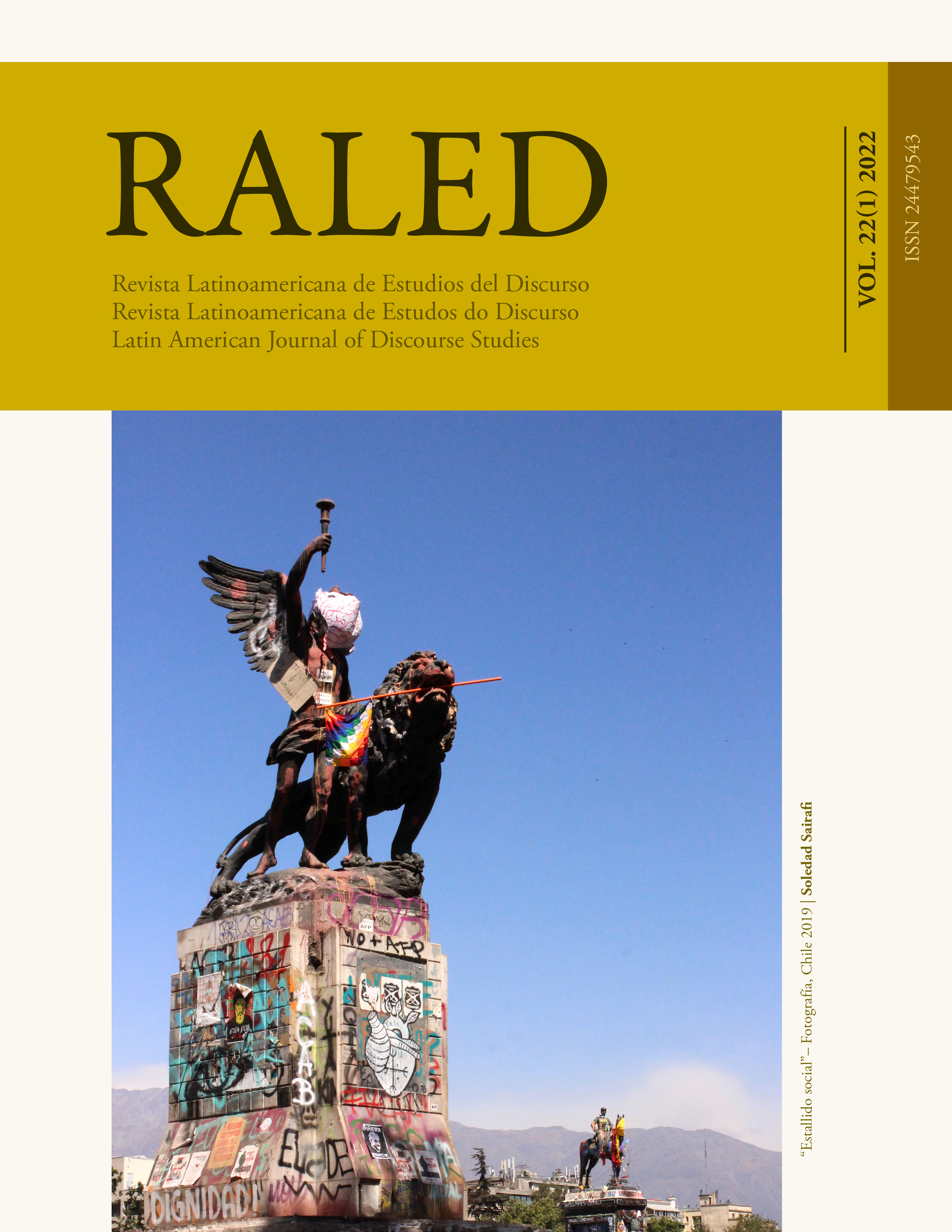A disputa discursiva em torno dos conceitos de ‘estupro’, ‘consentimento’ e ‘violência’ em um acórdão do TJRS-Brasil
DOI:
https://doi.org/10.35956/v.22.n1.2022.p.24-36Keywords:
Discurso judicial. Gênero. Estupro. Consentimento. Violência.Abstract
From a discursive point of view, the understanding and representation of gender frequently are objects of struggle in legal discourse, especially in what concerns the distinctions between men and women, their social roles and their relations. In order to investigate these discursive disputes, in this work I apply conceptual and analytical tools from Critical Discourse Analysis (CDA), Systemic Functional Linguistics (SFL) and Feminist Studies to investigate the representations of gender and sexual violence in a Brazilian appellate decision on a rape trial. The analysis indicates that the Brazilian legal system is still anchored on patriarchal presuppositions about women’s sexuality. In the appeal decision analysed, the magistrates framed the dispute over the concepts of ‘rape’, ‘consent’ and ‘violence’ according to the prevailing cultural view that the complainant/victim did not show enough or appropriate resistance, and that the absence of physical violence and ‘major threats’ in cases of coerced sex is equal to consent.
Downloads
References
Arruzza, C., Bhattacharya, T. e Fraser, N. 2019. Feminism for the 99 percent: A manifesto. London: Verso.
Bargu, B.; Bottici, C. 2017. Introduction. Em Bargu, B. e Bottici, C. (eds.). Feminism, capitalism, and critique: Essays in honor of Nancy Fraser. New York: Palgrave Macmillan.
Bohnenberger, M., e Bueno, B. 2021. Os registros de violência sexual durante a pandemia de Covid-19. Em Anuário Brasileiro de Segurança Pública 2021. Fórum Brasileiro de Segurança Pública, ano 15.
Brasil, 2021. Anuário Brasileiro de Segurança Pública 2021. Fórum Brasileiro de Segurança Pública, ano 15.
Cameron, D. 1997. Theoretical debates in feminist linguistics: Questions of sex and gender. Em Wodak, R. (ed.) Gender and discourse. London: Sage.
Canuto, S. B. F. e Colares, V. 2017. A representação da mulher no sistema jurídico penal: Um estudo de caso a partir das análises das expressões referenciais. Language and Law / Linguagem E Direito, 4:2, 34-55-88.
Coates, L. e Wade, A. 2004. Telling it like it isn’t: Obscuring perpetrator responsibility for violent crime. Discourse & Society 15, 5: 499-526.
Coates, L., Bavelas, J. B. E Gibson, J. 1994. Anomalous language in sexual assault trial judgments. Discourse & Society, 5, 2: 189-206.
Colares, V.S.F.A. e Costa, F.O. 2018. Análise Crítica do Discurso Jurídico (ACDJ): O Caso do Projeto de Lei Nº. 3.842/2012 e a Tutela da Dignidade do Trabalhador. Direito e Justiça: Reflexões Sociojurídicas, 18: 31.
Ehrlich, S. 2003. Coercing gender: Language in sexual assault adjudication processes. Em Holmes, J. e Meyerhoff, M. (eds.). The handbook of language and gender. Oxford: Blackwell.
Ehrlich, S. 2007. Legal discourse and the cultural intelligibility of gendered meanings. Journal of Sociolinguistics, 11, 4: 452–477.
Ehrlich, S. 2015. “Inferring” consent in the context of rape and sexual assault. Em Solan, L., Ainsworth, J. e Shuy, R. (eds). Speaking of language and law: Conversations on the work of Peter Tiersma. Oxford: Oxford UP.
Ehrlich, S. 2016. Post-penetration rape: Coercion or freely given consent? Em Ehrlick, S., Eades, D. e Ainsworth, J. (eds). Discursive constructions of consent in the legal process. Oxford: Oxford UP.
Fairclough, N. 2003. Analysing discourse: textual analysis for social research. London: Routledge,
Fairclough, N. 2010. Critical discourse analysis. Revised edition. Harlow: Longman.
Figueiredo, D. C. 2000. Victims and villains: Gender representations, surveillance and punishment in the judicial discourse on rape. Tese (Doutorado em Letras/Inglês – Estudos Linguísticos e Literários), Universidade Federal de Santa Catarina.
Figueiredo, D. C. 2004. Gender categorization in the judicial discourse on rape. Em Young, L. e Harrison, C. (eds). Systemic Functional Linguistics and Critical Discourse Analysis. London: Continuum.
Figueiredo, D. C. 2014. Discurso, gênero e violência: Uma análise das representações públicas do estupro. Linguagem e Direito/Language and Law, v. 1, 141-158.
Figueiredo, D. C. 2020. Direitos sexuais como direitos humanos: Reflexões sobre o discurso jurídico em casos de estupro. Em Almeida, D., Coulthard, M. e Sousa-E-Silva, R. (orgs.) Perspectivas em Linguística Forense. Campinas/SP: Unicamp/Publicações IEL.
Fraser, N. 2009. O feminismo, o capitalismo e a astúcia da história. Mediações, v. 14: 2, 11-33.
Fraser, N. 2013. Fortunes of feminism: From state-managed capitalism to neoliberal crisis. London: Verso.
Fraser, N. e Jaeggi, R. 2018. Capitalism: A conversation in critical theory. Cambridge: Polity Press.
Mooney, A. 2007. When rape is (not quite) rape. Em Cotterill, J. (ed.) The language of sexual crime. Basingstoke: Palgrave MacMillan,
Tiersma, P. 2007. The language of consent in rape law. Em Cotterill, J. (ed.) The language of sexual crime. Basingstoke: Palgrave MacMillan.
Tuerkheimer, D. 2015. Rape on and off campus. Emory Law Journal, 65: 1.
Van Leeuwen, T. 2008. Discourse and practice: New tools for critical discourse analysis. Oxford: Oxford UP.
Downloads
Published
How to Cite
Issue
Section
License
Copyright (c) 2022 Débora de Carvalho Figueiredo

This work is licensed under a Creative Commons Attribution-NonCommercial-NoDerivatives 4.0 International License.
The authors retain the copyright and guarantee RALED the right to be the first publication of the work as well as a Creative Commons Attribution License that allows others to share the work with recognition of authorship and the initial publication in this journal.




